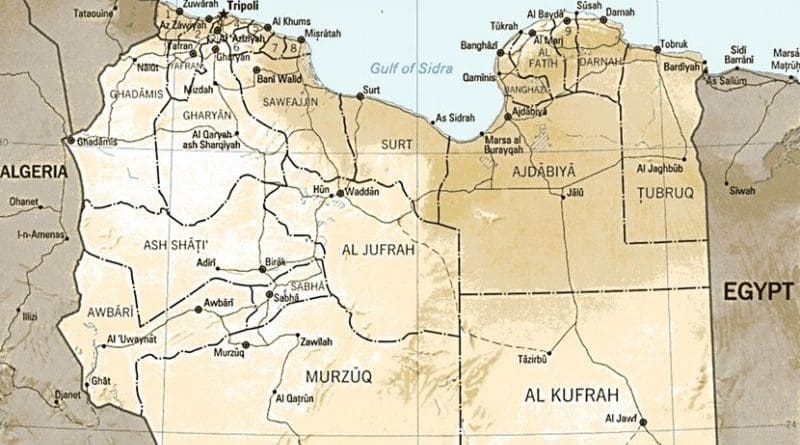Libya: Change In The Anti-Gaddafi Front – OpEd
By Press TV
By Mohyeddin Sajedi
Muammar Gaddafi’s opponents are still a long way from reaching a turning point in military operations and Gaddafi has yet to use full force to attack opposition-controlled regions.
The outcome of NATO air raids on Tripoli and other key cities in Libya still cannot guarantee that the Libyan army infrastructure has been damaged in a way that prevents it from using weapons such as Scud rockets.
The assassination of Abdul Fattah Younis, Libya’s former Interior Minister and the Commander in Chief of Libya’s National Liberation Army, has deepened the division between the Libyan dictator opposition to an extent that the National Transition Council (NTC) ordered the dissolution of the opposition government. This government is tasked with the execution of the policies that the NTC defines and determines.
The dissolved government was headed by Mahmood Jibril. It was mostly constituted by members who had returned from their refuges in the US and Europe, like Mahmoud Jibril himself or Mahmoud Shammam (Minister of Media Relations) or Ali Essawi (Minister of Foreign Affairs) and Ali Tarhouni (Oil Minister.)
NTC, chaired by Mustafa Abdul Jalil, has yet to provide a convincing explanation regarding the assassination of Abdul Fatah Younis to the public, Fatah supporters and members of his tribe who hold NTC responsible for his murder. Thus far, the scenario that Abdul Fatah Younis was assassinated by the Abu Ubaidah Jarrah Brigade, which is notorious for its extremist Islamic tendencies and which is close to Afghanistan’s Taliban and the al-Qaeda Organization, has appeared more plausible.
The slain victim had since the outset of the 1969 Gaddafi Coup d’etat stood beside him and was for a long time the minister of public security and had lately assumed the post of Minister of Interior. In both capacities, his chief responsibility was to suppress the Gaddafi opposition and particularly those who currently fight against Gaddafi soldiers on the battle fronts. There is the possibility that his former victims had exacted revenge on him. The Gaddafi regime also favors the responsibility falling on the shoulders of extremist Islamists and the al-Qaeda. The day following the murder of Younis, Gaddafi’s eldest son announced that the government had reached an agreement with these Islamists on the annihilation of the forces coming from the West.
The possibility also exists that Abdul Fatah Younis was killed by those who had fled the Libyan Army and defected to the opposition. Some of these forces have been assigned by Gaddafi to infiltrate the ranks of the opposition.
The disagreements between the Islamic and Western factions in NTC and in the previous government and in all Gaddafi’s opposition are deep.
The discrepancy was intensified with Saif al-Islam Gaddafi’s interview with The New York Times where he claimed that he is negotiating with Dr. Ali al-Salabi. He is known as the Islamic leader of the Gaddafi opposition. Salabi himself admitted to such negotiations but refuted as incorrect his reaching an agreement with the Gaddafi regime.
While the Western wing played a pivotal role in drawing NATO into Libya, some Islamists disagree with the NATO intervention. Moreover, the move by the NTC in accepting Bernard Henri Lévy, the famous French Zionist, and his claim based on carrying a message from the NTC to the Israeli prime minister has fuelled the anger of the Islamic faction; even though the NTC dismissed this claim as false.
The Islamic faction has more weight among the Gaddafi opposition and has no faith or confidence in many of the government officials who have abandoned Gaddafi, and has even called for the trial of some of them for participation in the atrocities of the Gaddafi regime. Some of the leaders of this wing reject any cooperation with NATO and demand a resolution based on Gaddafi’s resignation and the aversion of further bloodshed. This wing is distrustful of the seculars coming from the West, particularly when they speak of devising a new constitution akin to Western countries, which will have conflicting articles with Islamic principles.
Whereas most of the anti-Gaddafi combatants are also Islamists, the faction coming from the West is focused more on the manner of the expansion of foreign relations and the global introduction of the NTC, which has of course gained some success. The US and the European Union (EU) have recognized this Council as the representative of Libya.
The new anti-Gaddafi government headed by Mahmoud Jibril will be formed again, but only provided that he spend more time in Benghazi and Libya, as he and many of his ministers are located abroad, especially Qatar. The new government will probably make less use of those coming from the West.
The US and the EU have taken refuge behind their military automaton (the NATO army) and can no longer walk back the trodden path. Neither feels assured as to the post-Gaddafi Libyan future. Following the defeat of the West in foreseeing the Egyptian and Tunisian Revolutions, the US and EU policies show that they still have no correct grasp of the realities of Arabic countries. If the West is waiting for democratic regimes to rise in Libya and Syria – after helping the fall of Gaddafi or Bashar Assad – then it has to behold the Iraq experience. Baghdad has turned into the main ally of Syria and condemns the suppression of the public uprising in Bahrain, a small Island whose regime the US still backs to preserve its naval base.
Could the current Libyan developments turn into an obstacle in the way of US and EU efforts for regime change in Syria?

